
PREV ARTICLE
NEXT ARTICLE
FULL ISSUE
PREV FULL ISSUE
INTELLIGENT COLLECTOR INTERVIEWS BOB SIMPSONThe Winter 2020-2021 issue of Intelligent Collector from Heritage Auctions has a great interview with collector Bob Simpson, whose amazing U.S. coin collection is being sold. Reprinted with permission from The Intelligent Collector magazine. ©2020 Heritage Auctioneers & Galleries Inc. (HA.com). Thanks. -Editor 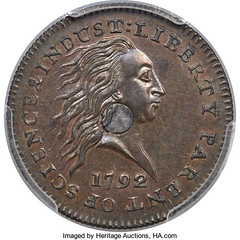
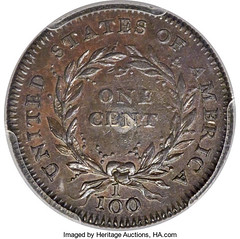
1792 Silver Center cent Bob Simpson's Sweet Spot CO-OWNER OF THE TEXAS RANGERS FINDS NOW IS THE TIME TO RELEASE ONE OF THE WORLD'S GREATEST COIN COLLECTIONS By Robert Wilonsky What drew you to collecting? I was probably drawn through the eyes of the child. When we went on a trip, I'd get Daddy to stop in as many towns as he would for me, and I'd get rolls of coins to look at until I could get him to stop again. And so, to that little kid – I was probably 12 – that created value. A lot of values that you pursue as an adult were from your youth. A lot of them. People ask me why I was drawn to oil and gas, because there's no history in my family of it. But when I was little, we were on the plains around Lubbock. Daddy was a cotton farmer. We'd drive by a farm and see a lot of pump jacks, and he said, "Well, you know, I almost bought that farm." And so he created a value in me that pump jacks meant wealth, oil meant wealth. Maybe the reason we moved to it. I don't know. Or is it possible that a reason you followed your passions and pursuits is because you didn't want to be one of those guys who said, Almost. I almost bought that land. I almost bought that well. I almost bought that coin. You wanted to be the guy who did, in fact, buy those things. Yeah. In a lot of areas, yeah. I know how to squeeze the trigger while others watch, because that's my nature. I'm a decision-maker, acquirer, captain of the ship. And so, to me, that's fine. The one thing I did learn from Daddy is not to worry about risk, because he was a dryland farmer. That's about the riskiest occupation in the world. Did you view coin collecting as risky? I viewed it as the opposite, as a haven more than a risk asset. When you were 12 and asking your father stop in a town to get you a roll of coin, what were you looking for? Mercury dimes – the most famous, the 1916-Ds, were being found. Maybe you had a copper penny. You could still get Walking Liberty half-dollars. And you had a chance there to get a fairly expensive one. So, instead of being a kid buying packs of baseball cards looking for a Mickey Mantle, you were getting rolls of coins. Yeah. And, remember, in terms of risk, there wasn't any. Right. You're just swapping out a dollar bill or a $10 bill for a roll of coins. And you could've made a few hundred bucks. And you're 12. But how did you know about that at the age of 12? One of my brothers was a collector. I was the youngest. I used to take some of his coins. But it helped my collection. Actually, though, I paid him back. One thing I learned as a youngster is I tended to always have money one way or another. I had my own chickens or cattle or hogs. My brothers, particularly the oldest one, were always broke. 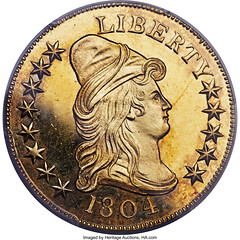
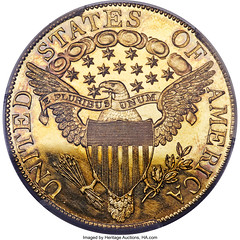
1804 Plain 4 proof eagle I'm curious how your perception of collecting has changed from that 12-year-old boy in the backseat thumbing through rolls just trying to find that thing that may or may not be, you know, magical, like the bronze 1943- D Lincoln penny which I know you thought you'd found when you were a boy. I thought, "I'm 16, I think I've got a $40,000 coin, and I'm rich." But it was valueless. I still have it, though. Because I just held the dream. There are some qualities that develop. Try to be the best at what you're doing. And try to acquire the best assets that you can. And I would caution anybody to stay away from the apparent bargains. If you'd like to have a lake lot, it doesn't do you any good to buy a lot a block from the lake just because it's cheap. Whether it's oil and gas or land, I learned over the years to buy the best. And the best is the most expensive. It'll also do the best in the future in terms of its financial performance. It goes hand-in-hand. You're doing yourselves no favor to buy the "bargain." I assume this applies to coins as well ... One of my favorite coins is the 1920-S $10 gold piece, probably the finest $10 Indian piece in the world. It's in the set I'm going to keep. But, again, the price was painful. I learned a long time ago that the best usually comes at a price that hurts. And so, I would tell anybody bidding here, if you see the opportunity that's unique to you, it's probably going to hurt to buy it, but you'll never regret it. The only thing that hurts more is not buying that thing you desperately want. You'll never regret it. You can always get more money, but some of these opportunities, you can't produce another one. That's what I would share, that wisdom with potential buyers. Here's a guy that's been doing it a long time in a lot of arenas, including the Rangers. We bought that at auction. Usually, the good stuff hurts. How has your philosophy behind your collecting changed since you were a little boy? I'm more interested in just outright art – the beauty of the collection, of the coin. And what I would hope somebody would say about my collection is that, first, he had a great eye for beauty as well as history. I think it speaks for itself. Do you find that you are more unorthodox than most when it comes to collecting? I was ahead of my time, so to speak. I have my own ability to see beauty. I think it's just the same as artwork. I have artwork. It's just a natural thing. You either kind of got it or you don't. Did you find that your ability to recognize the beauty of a coin was there from the beginning, or was that a thing you also had to develop? No, it was natural. You could throw some coins out right here, and you could tell to some degree, just for starters. I just have a good eye for it. I didn't think of charging money, like Certified Acceptance Corporation is doing now. But that's really what they're doing, is to give people assurance. Let's say you've got a coin graded 66 and a 67 comes along. I can't tell you how many times I've kept my 66 over the 67 or the 67 over the 68. Is the 68 worth more? That big a gap, it probably is. But the 66 to the 67, when the 66 has more eye appeal, you probably can't sell the 67 for more money than the 66. It's often said that collectors are just temporary custodians of history. Is that how you think of coin collecting? Yeah. It's true not only with collections but possessions in general. There's a cycle you go through in life, which is: When you're younger, your perspective is infinity and you're immortal, and so you're an accumulator. At some point, it goes the other way, where you think of yourself more as a steward, and then what's the ultimate resolution of this asset. Should I share with other collectors? Leave it to my kids? What am I going to do? We tend to over-clutter our lives and get beyond our capacity to appreciate what we have. I'm 72, so you reach the age where you're thinking about it differently. You're more aware that you were the custodian. I've kept a lot of my coins that I would encourage my children to never sell. But most we're going to share with the community, that thrill of owning that coin they get they take home and would like to hold, like to own and then spread the joy. And that's sincere. 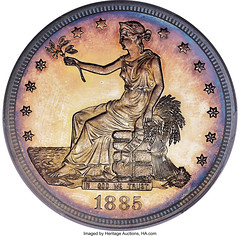
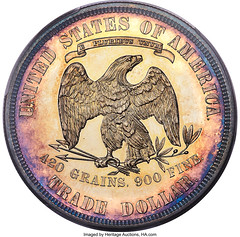
1885 Trade dollar I keep going back to that 12-year-old in the back seat of the car on the family trips going through coins. I wonder what he would say to the man 60 years later who has acquired such an extraordinary collection and has decided now to part with some of those coins. I wonder if that kid could've believed that he could amass such a remarkable collection. No, he couldn't have seen that coming. But the concept of giving them back to the community, fellow collectors, is a maturity thing. It would never have crossed his mind. He wouldn't have worried about it. But I think it's the right thing to do. I've been wanting to do this for years, to some extent, but I haven't had time. It is a painful process. I spent days doing it. I am selling some that, on a different day, I might have kept. But there are people that would appreciate some of these coins. Well, absolutely. And cherish them where I don't. It's almost just wrong to be that gluttonous. Well, it is. But that's part of the joy of collecting, right? I mean, as a collector myself, when someone says, "I want to sell you this thing you didn't think you'd ever be able to acquire," it's thrilling. And that's because you will cherish it, and you know that one day you might hand it down or one day you might sell it to somebody else who loves it for the same reasons you do. There are some coins on down the scale, where you think, maybe, "Is there anybody that loves those?" And there are. It's just a different guy, a different collection, a different viewpoint. There's no chance I could appreciate that many coins. Some of them, I would have three or four of the same coin – a coin that I loved every time I saw it, so I bought it. The collector's curse. The fear of never seeing something again. Let somebody else have a go at it. I wasn't buying them because I thought they were going to make me a fortune. I was buying them for their beauty. This is a passion. It's a good thing to do. I hope it continues, and I hope the youngsters pick up the value. Theirs will be a little different because they didn't sit in the back of the car looking through rolls of coins, probably. But theirs will be more of a history, beauty, investment. I'm hoping there are other people out there that have shared this passion as a youngster and would like to fulfill their dreams.
To read the complete issue, see:
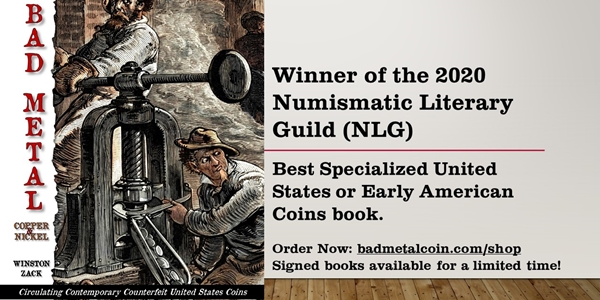
Wayne Homren, Editor The Numismatic Bibliomania Society is a non-profit organization promoting numismatic literature. See our web site at coinbooks.org. To submit items for publication in The E-Sylum, write to the Editor at this address: whomren@gmail.com To subscribe go to: https://my.binhost.com/lists/listinfo/esylum All Rights Reserved. NBS Home Page Contact the NBS webmaster 
|